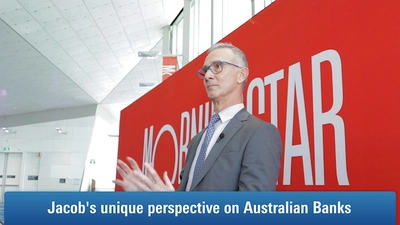The article was first published on Morningstar Australia 30 May 2022.
Antipodes founder and chief investment officer Jacob Mitchell is seeing opportunities for companies involved in the energy transition, emerging markets and the US.
But investors should ‘definitely avoid’ the Australian banks in the current environment, he warns, given a “lack of any margin of safety” and almost the “highest ever relative valuations versus global banks”.
Mitchell outlined his views on global investing opportunities on the sidelines of the 2023 Morningstar Investment Conference, including how to invest in the AI revolution.
Watch the full video interview
Transcript:
Should investors be cautious of global markets in the current environment?
Jacob Mitchell: Cautious? Yeah, I think relative to the top down, yes, in areas of the market where you don’t see the recession or tougher consumer environment is priced in, we are cautious. And then the liquidity environment is a second issue, like even if we resolve the debt ceiling, the Treasury has to rebuild its cash position and the Feds doing QT.
There’s always a delay when you lift interest rates and that transmission in the U.S. is longer, than it is in other western economies because mortgages are fixed rate. So the shocks happen in the banking system because the banking system can’t pass on the rate rises, as fast as they they do in other parts of the world.
So we’ve seen, the stage 1 of the banking system starting to have its issues. I think stage 2 is that translates to the economy and unemployment starts to go up and generally that’s not priced in, the market multiple being roughly 20 times, we don’t think that’s priced in. And that’s happening against this backdrop of real tightening in liquidity. The Fed and the Treasury is sucking cash out of the system, and that’s not generally great for asset prices.
Why do you think investors should avoid Australian banks?
JM: Yeah, it really comes down to the lack of any margin of safety in Australian banks. I mean, they’re almost at their highest ever relative valuations versus global banks.
The starting position is that they’re very well, their capital positions are sound, et cetera. Well, the only reason their capital position is sound is because the risk weights on mortgages here are very low. And if you look at total loans to equity, they’re actually at the low end from a capital position perspective.
There’s two things that are going to impact, which we don’t think is priced in.
Number one, the lack of affordability just means there’s no demand for housing loans. So you got a shrinking pool of demand and all the players are being, arguably behaving, the oligopoly is slowly breaking down. So they’re being much more aggressive in their competition for the new, you know, for the incremental loans. And we don’t think there’s an easy way to fix that? I mean, the only way to fix the affordability issue is by the cut rates, but we still have this sticky inflationary environment or housing prices have to fall. And we know housing prices are pretty stable because of this shortage. So it’s really hard to resolve which is actually bad, right?
These banks aren’t going to grow. And if we do have a real downside scenario where unemployment starts to go up because the RBA gets forced to tighten too much, that’s when you start to worry about the capital position. So no margin of safety, we think multiple ways of losing. So, they’re definitely avoids.
Where in the world are you seeing opportunities at the moment?
JM: The big one is the energy transition, and there’s a lot of policy — we think it’s a policy supported super cycle investment in like principally electricity or electrical infrastructure. And I think companies like Siemens Energy (SMNEY), which is almost a one stop shop for that transition. So that’s one area I think is really interesting.
Broadly speaking, equities outside the US are lot cheaper. The multiple which is roughly 13 times versus close to 20 times in the US, so at 13 times you’re actually pricing in arguably a pretty bad macro environment anyway.
And in Europe, we’re very overweight, but predominantly through companies like Siemens Energy multinationals that are well positioned.
And then in the emerging markets, I think it’s really interesting point in the cycle for emerging markets generally because they actually have been far better behaved than western policymakers in the last couple of cycles. So we think they can start performing even without the Fed moving into a cutting cycle. And whether it’s China or Indonesia, but something as simple as Alibaba (BABA) which it’s gone through, everyone knows, it’s had regulatory issues. But those regulatory cycles, they do tend to come in cycles and we think they’re on the right side of that cycle and on a core e-commerce multiple of around 6 times, it’s pretty cheap. The business doesn’t really need to grow, it just doesn’t need to shrink that much to justify that type of multiple and we think it’s still a very dominant platform, so can protect its position.
Subscribe to receive the latest news and insights from the Antipodes team
This communication was prepared by Antipodes Partners Limited (ABN 29 602 042 035, AFSL 481 580) (Antipodes). Antipodes believes the information contained in this communication is based on reliable information, no warranty is given as to its accuracy and persons relying on this information do so at their own risk. This communication is for general information only and was prepared for multiple distribution and does not take account of the specific investment objectives of individual recipients and it may not be appropriate in all circumstances. Persons relying on this information should do so in light of their specific investment objectives and financial situations. Any person considering action on the basis of this communication must seek individual advice relevant to their particular circumstances and investment objectives. Subject to any liability which cannot be excluded under the relevant laws, Antipodes disclaim all liability to any person relying on the information contained on this website in respect of any loss or damage (including consequential loss or damage), however caused, which may be suffered or arise directly or indirectly in respect of such information.
Any opinions or forecasts reflect the judgment and assumptions of Antipodes on the basis of information at the date of publication and may later change without notice. Any projections are estimates only and may not be realised in the future. Information on this website is not intended as a securities recommendation or statement of opinion intended to influence a person or persons in making a decision in relation to investment. Unauthorised use, copying, distribution, replication, posting, transmitting, publication, display, or reproduction in whole or in part of the information contained on the website is prohibited without obtaining prior written permission from Antipodes.
Pinnacle Fund Services Limited ABN 29 082 494 362 AFSL 238371 is the product issuer of funds managed by Antipodes. Any potential investor should consider the relevant Product Disclosure Statement available at www.antipodesonespartners.com when deciding whether to acquire, or continue to hold units in a fund. The issuer is not licensed to provide financial product advice. Please consult your financial adviser before making a decision. Past performance is not a reliable indicator of future performance.


